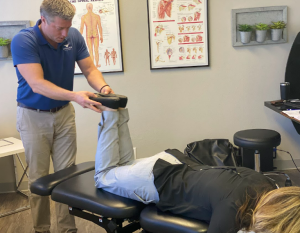Mastering Pain Management: The Best Methods for Alleviating Pain
Living with chronic pain can significantly impact a person's quality of life, making it essential to explore effective pain management strategies. We want to help you live your life pain-free, so we created this comprehensive guide to natural pain management techniques to empower and equip you to take control of your pain. By understanding the different types and causes of pain, you’ll be equipped with the information you need to make decisions about treatments that might be right for you. When looking for ways to manage your pain, there are various options you can explore. You can make lifestyle changes, address psychological aspects, and tailor strategies to your specific conditions to find a personalized solution.
What is Pain Management?
Pain management encompasses various approaches and interventions to alleviate or reduce pain. When you can stop the root of the pain, you can stop the symptom of pain. Managing pain involves a holistic understanding of pain and addressing its physical, psychological, and emotional dimensions. Effective pain management goes beyond merely masking the pain; it focuses on improving overall well-being and functionality.
Understanding Pain
Pain is your body’s alarm system and is meant to protect and to alert you when a system isn’t functioning properly. It is important to get to the root of pain in order as well as relieve it. To effectively manage pain, it is essential to understand its nature and characteristics. Pain can be broadly classified into two categories:
- Acute Pain: Acute pain typically results from an injury, surgery, or illness and usually resolves within a predictable timeframe.
- Chronic Pain: Chronic pain persists beyond the expected healing time and may last for months or even years. It can be caused by conditions such as arthritis, fibromyalgia, or neuropathy.
Importance of Effective Pain Management
Managing pain effectively is crucial to maintaining a good quality of life. Unmanaged pain can lead to decreased mobility, sleep disturbances, emotional distress, and reduced productivity. By implementing appropriate pain management strategies, individuals can regain control over their lives, experience reduced pain intensity, and improve their overall health and well-being.
Types of Pain Management Techniques
There are multiple methods, actions, and paths you can take to combat your pain so you can live your life comfortably and freely again! There are non-pharmacological techniques along with pharmacological options. At Vitality Integrative Wellness, we offer holistic approaches to pain management that cater to each person’s unique needs.
Non-Pharmacological Pain Management Techniques
- Physical Therapy: Physical therapy involves targeted exercises, stretches, and other interventions to improve strength, flexibility, and function while reducing pain.
- Massage: Therapeutic massage techniques can help relax muscles, reduce muscle tension, improve blood flow, and alleviate pain.
- Acupuncture: Acupuncture involves the insertion of thin needles into specific points in the body to stimulate the nervous system, relieve pain, and promote healing.
- Chiropractic Care: Chiropractors use hands-on spinal manipulation and other techniques to align the body's musculoskeletal structure, relieving pain for conditions like back pain and headaches.
At Vitality Integrative Wellness, Dr. Michael Bell conducts a chiropractic adjustment to help relieve pain.
- Regenerative Medicine: Regenerative Medicine has shown promise for treating a wide range of conditions. This innovative field aims to restore the functionality and mobility of patients by repairing and healing damaged tissues.
- Spinal Decompression: Spinal decompression is a safe, effective, and non-invasive approach to pain management. Whether relief is found through manual or mechanical spinal decompression, this technique promotes long-lasting pain relief.
Pharmacological Pain Management Options
Taking the easy route may not always yield the best results, especially when it comes to pain management. While pain relievers and anti-inflammatories have their benefits, relying solely on them is not recommended.
Overusing medications can potentially harm vital organs and often only provide temporary relief by masking the pain, rather than addressing the underlying issue. To achieve long-term pain relief, it is essential to uncover the root cause of your pain through holistic techniques.
- Over-the-Counter Medications: Non-prescription pain relievers like acetaminophen and nonsteroidal anti-inflammatory drugs (NSAIDs) can temporarily relieve mild to moderate pain.
- Prescription Medications: Stronger pain medications, such as opioids and muscle relaxants, may be prescribed for moderate to severe pain under a healthcare professional's guidance.
- Opioids vs. Non-Opioid Medications: Understanding the risks and benefits of opioids versus non-opioid medications is crucial for making informed decisions about pain management, considering factors such as potential side effects, addiction risks, and individual needs.
Alternative Pain Management Therapies

- Mindfulness and Meditation: Mindfulness and meditation techniques can help individuals develop a greater awareness of their pain, reduce stress, and promote relaxation.
- Biofeedback: Biofeedback techniques enable individuals to gain control over their physiological responses, such as heart rate and muscle tension, to manage pain and enhance overall well-being.
- Aromatherapy: Essential oils, when used in aromatherapy, can provide pain relief, relaxation, and mood enhancement through their therapeutic properties.
Lifestyle Changes for Pain Management
You can also change the trajectory of your life based on how you live it! Looking at your habits and recognizing the ones that may not be the best for your overall health can seem overwhelming and even disappointing. When reflecting on your habits, don’t degrade yourself, but instead, use the ones you know you can do better on as a way of growth and self-love!
- Diet and Nutrition: Maintaining a balanced diet is both crucial and challenging, demanding our
- Exercise: Moving your body daily for at least 30 minutes will keep your joints mobile and flexible while building strong muscles. Regular physical activity, tailored to individual capabilities, can reduce pain, improve strength and flexibility, and enhance mood.
- Sleep Hygiene: The third most important factor to living a healthy and abundant life is getting the proper amount of sleep. There are more benefits to getting a good night's rest other than avoiding the “crankies” in the morning! Prioritizing healthy sleep habits, such as maintaining a regular sleep schedule and creating a conducive sleep environment, can help manage pain and cortisol levels and improve overall well-being.
Psychological Aspects of Pain Management
At times, the physical pain we experience serves as a manifestation of underlying psychological distress. When we suppress or disregard stress, anxiety, or unresolved trauma instead of confronting the root cause directly, these unresolved emotions manifest as physical discomfort within our bodies. However, effective methods are available to delve deeper into these issues, allowing us to better understand the underlying reasons for our pain and our subsequent reactions. By exploring these methods, we can begin to unravel the connections between our emotional well-being and physical symptoms.
- Cognitive-Behavioral Therapy (CBT): CBT techniques aim to identify and modify unhelpful thought patterns, develop effective coping strategies, and promote positive behavior changes to manage pain.
- Coping Strategies: Developing healthy coping mechanisms, such as relaxation techniques, distraction, and reframing, can help individuals better manage pain and its impact on daily life.
- Support Groups: Joining support groups, either in-person or online, can provide valuable emotional support, shared experiences, and practical advice for individuals living with chronic pain.
Pain Management for Specific Conditions

- Arthritis: Specific pain management techniques, such as exercise, heat and cold therapy, regenerative medicine, and assistive devices, can help individuals with arthritis alleviate pain and improve joint function.
- Fibromyalgia: A multidisciplinary approach that combines medication, gentle exercise, stress management, and cognitive-behavioral therapy is often recommended for managing fibromyalgia pain.
- Neuropathic Pain: Treatments for neuropathic pain may include medications targeting nerve pain, physical therapy, transcutaneous electrical nerve stimulation (TENS), and alternative therapies like acupuncture.
Preparing for a Pain Management Consultation
It is natural to feel apprehensive about a consultation appointment. Still, there are strategies you can employ to alleviate anxiety and ensure effective communication with your healthcare provider. These tips will equip you to express your needs clearly and familiarize yourself with what to expect during the appointment, fostering a more productive and comfortable experience.
- Track Your Pain: While experiencing pain, it’s beneficial to keep a record of your symptoms. take note of when they intensify, the time of day you typically notice them, and how long they last. Maintaining a pain log can facilitate discussions with your healthcare provider and equip you to ask relevant questions about your condition.
- Questions to Ask Your Healthcare Provider: To enhance your understanding of treatment options, potential side effects, and long-term management strategies, it is beneficial to compile a list of questions to ask during your pain management consultation. This proactive approach enables you to gather relevant information and clarifications, ensuring that you are well informed about your condition and the available options for effective pain management. By asking targeted questions, you can engage in a meaningful discussion with your healthcare provider and actively participate in your own care.
- What to Expect During the Appointment: Gaining familiarity with the typical proceedings of a pain management consultation, such as assessments, treatment plan discussions, and goal-setting, can be valuable. Having a basic understanding of what to expect can enhance your comprehension of the process. This knowledge equips you to communicate your needs and concerns more clearly and effectively, promoting a mutually beneficial dialogue with your healthcare provider.
Next Steps…
We are here to help you at Vitality Integrative Wellness! We believe in treating the root cause of pain for long-lasting relief so you can live your best life. The pain management services we offer are:
- Regenerative Medicine
- Spinal Decompression
- Chiropractic Care
- Cold Laser Therapy
- Functional Medicine
Effective pain management is a multifaceted approach that requires an understanding of different techniques and strategies. You can find a personalized pain management plan that works for you by tailoring your pain management strategies to specific conditions. Remember, everyone's pain journey is unique, and it may take time and experimentation to discover the most effective pain management strategies. With perseverance and the support of healthcare professionals, a pain-free life is attainable. Schedule a consultation with a healthcare provider at Vitality Integrative Wellness now!




